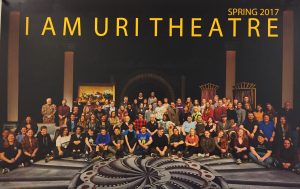Photos courtesy of the University of Rhode Island Theatre Department
I sat down to talk with the director of the University of Rhode Island Theatre’s upcoming production of Shakespeare’s “Measure for Measure,” Rachel Walshe. “Measure for Measure” is Shakespeare’s darkest comedy, filled with sex, power and deception.
It tells the tale of how the Duke of Vienna leaves Lord Angelo in charge and goes “undercover” to see how well Vienna fairs without him. Angelo throws Claudio in jail and becomes even more strict about the sexual laws in place already, such as being prohibited from having sex unless you are married. Isabella, Claudio’s sister, is about to become a nun when she finds out her brother is to be executed. She then goes to Angelo to ask leniency for her brother and Angelo gives her an ultimatum. She either must have sex with him or her brother dies.
This is when the Duke, appalled and shocked by the matters at hand, steps in and creates a plan. At the end of the play, it is very important to note that the “solution,” as with many– if not all– of Shakespeare’s plays, is that the Duke asks Isabella to marry him. This was interesting because today we marry mainly for love, but in the Elizabethan Era marriage was a stabilizing force, really meaning “for better or for worse.” Walshe has a lot of ideas and a strong vision of how the play will be created.
Walshe is a professional theater director, and along with directing here at URI, works at the Sandra Feinstein-Gamm Theatre (a.k.a. “the gamm”) in Pawtucket, Rhode Island. Walshe has trained in Chicago, Boston and the UK and has been directing for about 15 years.
One of the things I was curious about was the process of choosing a director for the show and Walshe told me that it was a department process and a mixture of students and teachers as well.
“The department looks at a play and says, is this educational?” Said Walshe, elaborating. “And being a Shakespearean play, it already is, but this one in particular talks a lot about power and governance, threat of sexual assault,” and how it is a very modern story, this threat, while it may be told in verse, could happen today.
Walshe says she’s hopes for the audience to relate, understand and be entertained. The style of the show is based in the 70s due to the birth of the porn industry and AIDS becoming more outed into the spotlight. Walshe said it was interesting to her the ways we legislate how people have sex and how sex workers’ lives were being ruined by a law so they struggled with finding work. She also wanted to tell a story from a time in history where we did not have the internet yet (because one google search is all it takes these days), but wanted to make sure it was relatable to the audience.
One very notable change to the play, which I really liked and thought was very cool when I heard, is that the Duke is being played by a woman. Walshe said she “really wanted to cast it as a woman because of gender dynamics” and explained how she did want the audience to see how it was odd Isabella marries the Duke instead of going into the nunnery. She wanted to show power in a woman’s hands and have a “non traditional” take on it.
Finally, I asked Walshe how her artisticness would be seen through “Measure for Measure.” She replied with a laugh and continued to say that it is really hard to see and reflect on one’s own artisticness, but that she really liked to add music. Generally all Walshe wants to see is that the audience understands, relates to, and enjoys the show.
URI Theatre’s production of William Shakespeare’s “Measure for Measure,” described by Walshe as “Shakespeare’s darkest sex comedy” will be performed in the J Studio of the Fine Arts Center during the weekends of Feb. 22 through 24 and March 1 through 3 at 7:30 p.m., as well as Sundays Feb. 25 and March 4, 2:00 p.m. Tickets: $20 General, $15 Seniors, URI Faculty/Staff and Students.





